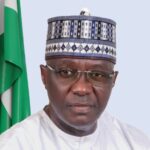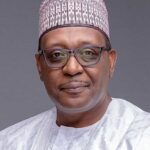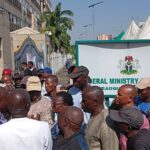After an election comes the serious business of governing. But five months into office, Nigerians are wondering: Where is the federal government? Where is President Tinubu and ‘all his men’? Where is the “renewed hope”?
Yes, we are aware it takes some time for a new government to settle down and come to grips with the challenges on the ground. This is particularly true for Nigeria where those outside of government often lack sufficient information about the true state of things inside it, necessitating a period of learning curve even for the ablest of leaders.
We recall, however, the repeated promise to “hit the ground running from Day One” during the campaigns and following victory at the polls. For example, while unveiling his campaign council and manifesto in late October last year, then APC Presidential Candidate Bola Ahmed Tinubu vowed that “This plan is not only a roadmap to a prosperous future, it serves as notice to the Nigerian people that, if elected, Senator Shettima and I shall work tirelessly to reach that promised future from the first moment of the first day we enter office”.
Moreover, as candidate, President Tinubu made his previous executive experience in government, and his ability to quickly assemble and lead a team to tackle the country’s challenges headlong, the pillars of the campaign. Yet, five months into office, there is little of hit-the-ground-running in this government; if anything, the opposite. As a result, a cloud of cynicism, dejection and hopelessness is slowly but surely enveloping the country.
We note three reasons for this chastening turn of events for the government. First, many clear-eyed observers have sensed a characteristic aimlessness, and of dancing to discordant tunes in the government. True, on his very first day as President, Tinubu swiftly declared “fuel subsidy gone”, and shortly afterwards officially announced the devaluation of the naira in a bid to “unify” its lingering multiple exchange rates. He also signed a raft of orders to stabilize treasury receipts and sort out tax policy in the short-term. For a brief period, these gave the impression of a government that knows its onions.
The catastrophic consequences of these policies, however, are now clear. Rising inflation and other associated problems have pushed the economy into a tailspin, and with it, more millions of Nigerians deeper into poverty. Fuel subsidy, in fact, is proving literally impossible to “remove”, and has since surreptitiously returned. The federal government, this newspaper exclusively reported last month, paid a total of N169 billion in August alone, despite petrol now selling at more than three times the rate in May this year.
This amount, extrapolated for 12 months (N2.28 trillion), will be roughly equal to the average of N1.99 trillion which, the Nigeria Extractive Industries Transparency Initiative (NEITI), said in its latest oil and gas industry report, the government spent annually on fuel subsidy from 2015 to 2022. Worse, subsidy spending is likely to climb as conflict in the Middle East pushes the global economy into more uncertainty, further cementing the impression of a government that had not clearly thought out a policy before implementing it.
Removing fuel subsidy without addressing the structural problems of local refining and corruption in the oil sector, as the government must know by now, was foolhardy. Moreover, the palliative measures designed to help are in shambles. The payment of N25, 000 to 15 million households, commencing this month, is likely to worsen the situation, not ameliorate it; never mind the heavy borrowing for it. Even assuming all the transfers will reach the targeted poor, which in the context of governance in this country is an unrealistic expectation, what fate befalls the poor households in the fourth month when the programme would have ended?
Yet, much the same shambles applies to the currency management, the second of the government’s signature policies so far. It is easy to declare “unification” of exchange markets by word of mouth. It is easy also to announce removal of restrictions on scores of items for which importers can bid forex from official windows. But where is the liquidity to meet increased demand? As more demand puts pressure on the limited forex supply, the naira is likely to continue to tumble, pushing Nigeria—God forbid—on the path towards Zimbabwe.
Secondly, President Tinubu’s appointments to offices of state so far appear more sensitive to political expediency than the need or ability to solve the country’s problems. Tinubu has appointed a record number of ministers and aides; and has created new ministries to accommodate more appointees. Yet, there is little sense that the appointments are meant to deliver on the campaign agenda, or will do so. Political reward for electoral service is important in democratic politics, we know, but so too is the need to reinvigorate a country that for long, has tethered on the brink.
Third, the appointees too, do not appear to be in tune with what the moment requires, let alone to provide it. Few ministers or heads of agencies have hit the ground running. Almost no one in the cabinet or elsewhere in government is rolling out concrete plans to address the issues for which they are specifically charged. Instead, some are pushing out fanciful noises like building Nigeria’s network of roads with cement concrete, as if the whole country were the just the rural corner of it that they know.
For a government that is particularly focused on the economy, the key ministries and agencies on the economic front appear to have gone on holiday. So too have the security agencies. Nothing has been heard of the student loan programme, even as universities resume for academic programmes. Hardly anything also from other social sectors like health or humanitarian services. In short, many ministers have not been heard of again since their appointment, leaving many Nigerians to ask again: where is the government?

 Join Daily Trust WhatsApp Community For Quick Access To News and Happenings Around You.
Join Daily Trust WhatsApp Community For Quick Access To News and Happenings Around You.



